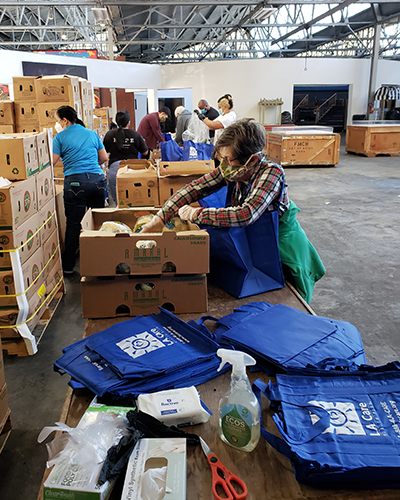Transformative Climate Communities Build Resilience During Pandemic

A child playing at the Bradley Green Alley & Plaza, which was renovated as one of Green Together’s projects in Pacoima. Photo courtesy of Joe Sorrentino, The Trust for Public Land
May 26, 2021
The Biden-Harris administration has big goals for both equitable climate action and resilient communities. These goals also underpin the California Strategic Growth Council’s (SGC) Transformative Climate Communities (TCC) Program, which researchers at the UCLA Luskin Center for Innovation are closely studying to identify best practices and lessons learned.
New reports from UCLA find that the local knowledge, partnerships, and established trust that TCC partners have in their communities allowed them to identify changing needs and respond quickly during the pandemic. These responses were bolstered by TCC funded community engagement plans and leadership opportunities to tackle community goals around climate action, resiliency, and more.
TCC was established by the California Legislature in 2016 to fund the state’s most disadvantaged communities to simultaneously reduce pollution, strengthen the local economy, and improve public health through a suite of community-driven projects and plans. These grants also help the sites build community capacity and pilot new models for self-governance. Cap-and-trade dollars have funded the first three rounds of the program, which SGC administers in partnership with the California Department of Conservation. Governor Gavin Newsom’s revised budget proposal released May 14 includes $420 million for TCC implementation and planning grants over three years.
This latest round of reports by UCLA document the progress of TCC grants in four sites: Fresno, Ontario, Watts/South L.A., and Northeast Valley L.A. A fifth site, Stockton, will soon be added to UCLA’s TCC evaluation cohort.
“We can learn a lot from these five living laboratories for holistic climate action,” said J.R. DeShazo, principal investigator on the ongoing study.
“For one, we’re seeing how the ingredients of community engagement, leadership, and capacity building necessary for transformative change over the long term also support community resilience today during the pandemic and its economic fallout,” he added.
Long-term disinvestment and discriminatory policies erode a community’s capacity for leadership, organizing or political capital. Meaningful engagement and decision-making for members of these and other historically disadvantaged communities can help ensure investments meet community needs while providing the conditions for continued positive change.
“It’s impressive,” added Jason Karpman MURP `16, project manager of UCLA’s TCC evaluation. “During a year when so much has come to a halt, these initiatives have continued to quickly adapt and meet the needs of residents.”

A volunteer sorts produce at a food distribution event during the pandemic in 2020. Photo courtesy of Mudtown Farms
One such initiative is MudTown Farms in Watts, an organization on the front-lines of battling food insecurity, which has deepened for local residents during the pandemic. The team rescues produce from a wholesale distributor before it goes to waste and redirects the fresh food to Watts residents through bimonthly, free distribution events.
The organization was well-positioned to make adjustments and provide food to residents in a COVID-safe way. Prior to the pandemic, the distribution events were set up like a grocery store, where residents would walk down aisles and choose food from shelves. This year, volunteers pre-sorted and packaged the produce and set up a drive-through to share food with residents.
“It’s been great to be able to continue to offer the service, especially when people need it the most,” said Ava Post, a program coordinator at MudTown Farms.
Watts isn’t the only community that adapted its programming. In Fresno, clean energy efforts like solar panel projects, continued to make great strides by providing contact-free and physically distanced installations. In Ontario, project partners continued to carry out their Community Engagement Plan through virtual meetings and outreach.
“With Transformative Climate Communities, we’re advancing an innovative model for community investment, and the key to successful innovation is making frequent adjustments based on sound evaluation,” said Saharnaz Mirzazad, SGC’s Deputy Director of Community Investment and Planning. “The Luskin Center for Innovation’s annual reports on TCC provide a wealth of quantitative and qualitative information that enables us to improve the program’s effectiveness on an ongoing basis.”
The progress reports, as well as other TCC resources, are centralized on the TCC resource page maintained by the Luskin Center for Innovation. Policymakers, community stakeholders, researchers, and others interested in equity-centered strategies to combat climate change can use this page to monitor progress, best practices, and lessons learned.


